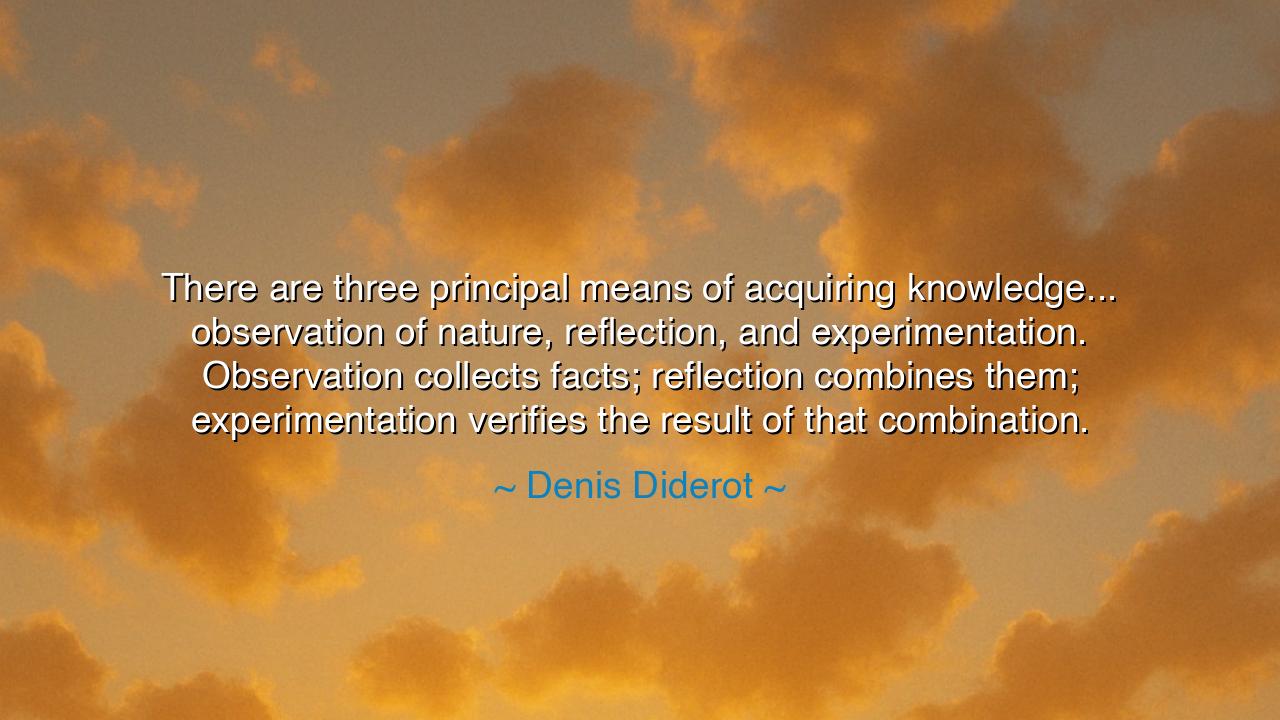
There are three principal means of acquiring knowledge...
There are three principal means of acquiring knowledge... observation of nature, reflection, and experimentation. Observation collects facts; reflection combines them; experimentation verifies the result of that combination.






Hear then, children of wisdom, the words of Denis Diderot, who spoke with the clarity of a flame against the darkness: “There are three principal means of acquiring knowledge... observation of nature, reflection, and experimentation. Observation collects facts; reflection combines them; experimentation verifies the result of that combination.” These are not idle words, but a triad of power, a ladder by which mortals climb toward truth. For in every age, mankind has hungered for understanding, and these three means have ever been the pathways that carry us from ignorance to light.
First, there is the observation of nature. This is the beginning of all wisdom, for the eyes, the ears, and the attentive soul are the gateways to truth. As the ancient shepherds once watched the stars and marked their steady courses, so too must we watch the world with patience and humility. Without observation, knowledge is rootless, like a tree planted in barren stone. To see truly, one must quiet the mind, put aside pride, and allow reality to speak. In the rustle of leaves, in the rise of the moon, in the shifting of clouds, there lies a scripture older than all books, waiting to be read by those who look with care.
Yet reflection is the second step, for the mere gathering of facts is not wisdom but clutter. Reflection is the sacred art of weaving: the mind draws threads of observation and binds them together into meaning. It is the fire of thought that turns raw stone into sculpture. Without reflection, the scholar is but a collector of shells, knowing not the sea from which they came. In reflection, we ask: What do these signs reveal? What patterns emerge? Here, the philosopher bends low, not to seize dominion over knowledge, but to let the scattered jewels form a crown of understanding.
The third pillar is experimentation. For thought and vision, though mighty, must be tested by deed. Just as the smith tests his blade upon the anvil to prove its strength, so must we test ideas in the furnace of action. Experimentation is the trial by fire, the measure of truth against the stubbornness of reality. History shows us that those who dared to experiment unlocked the gates of knowledge. Think of Galileo, who turned his telescope upon the heavens and confirmed with his own eye what reflection had dared to propose—that the earth was not the center, but a wanderer among stars. His courage to test, to see, to prove, shook kingdoms and gave birth to new worlds of thought.
Consider also the story of Edward Jenner, who in the 18th century observed that milkmaids who caught cowpox did not fall victim to the deadly smallpox. Through observation, he noted the pattern; through reflection, he discerned the connection; and through experimentation, he gave to the world the first vaccine, saving countless lives. This was not the work of chance, but the fruit of Diderot’s triad. Jenner’s courage reminds us that knowledge, when faithfully sought and boldly tested, becomes a gift to all humanity.
Thus, O seekers, the quote of Diderot is not mere philosophy but a law of life: see, ponder, and prove. It is the rhythm of discovery, the heartbeat of progress. To neglect one is to stumble. Observation without reflection is blind; reflection without experimentation is vain; experimentation without observation is reckless. Together, they are the harmony of reason and the foundation of truth.
Let the lesson be this: do not pass through life with unseeing eyes, nor with a mind that never questions, nor with hands that fear to test what the heart believes. In your own journey, practice the triad. Observe the details of your world with care, reflect deeply on what they mean, and experiment with courage, whether in your work, your art, or the choices of your soul. In so doing, you will not only acquire knowledge—you will embody wisdom.
Take then this teaching as a lamp: when you wake each day, resolve to watch the world as though it were new; when you sit in silence, let your thoughts weave meaning from what you have seen; when you rise to act, let your actions be the crucible where truth is proven. This is the way of the wise, the way of the ancients, the way by which humanity ascends ever nearer to the light.






AAdministratorAdministrator
Welcome, honored guests. Please leave a comment, we will respond soon